| Article ID | Journal | Published Year | Pages | File Type |
|---|---|---|---|---|
| 3329438 | Critical Reviews in Oncology/Hematology | 2009 | 15 Pages |
Gastroenteropancreatic endocrine tumours (GEP ETs) represent a relatively rare and heterogeneous group of neoplasms whose therapy can be challenging. The poorly differentiated, fast-growing cases are treated with chemotherapy. In the slow-growing ones, biotherapy is usually performed. Several categories of targeted therapies have been studied for their treatment in vitro and in vivo. A critical review of molecular alterations suggests a rationale for targeting angiogenesis, and the phosphatidylinositol 3 kinase (PI3K)/AKT/mammalian target of rapamycin (mTOR) pathway. Accordingly, antiangiogenic agents and mTOR inhibitors are presently the most tested agents in phase II and III studies. Bevacizumab, some multitarget inhibitors, and mTOR inhibitors showed promising results in patients with advanced GEP ETs. A limited activity has been reported for imatinib and epidermal growth factor receptor (EGFR) inhibitors. Combinations of molecular targeted therapies with different sites of action, and somatostatin analogues may be relevant to avoid molecular escape pathways. Future trials should include more homogeneous groups of patients and pay more attention to the subgroup with progressive disease.
